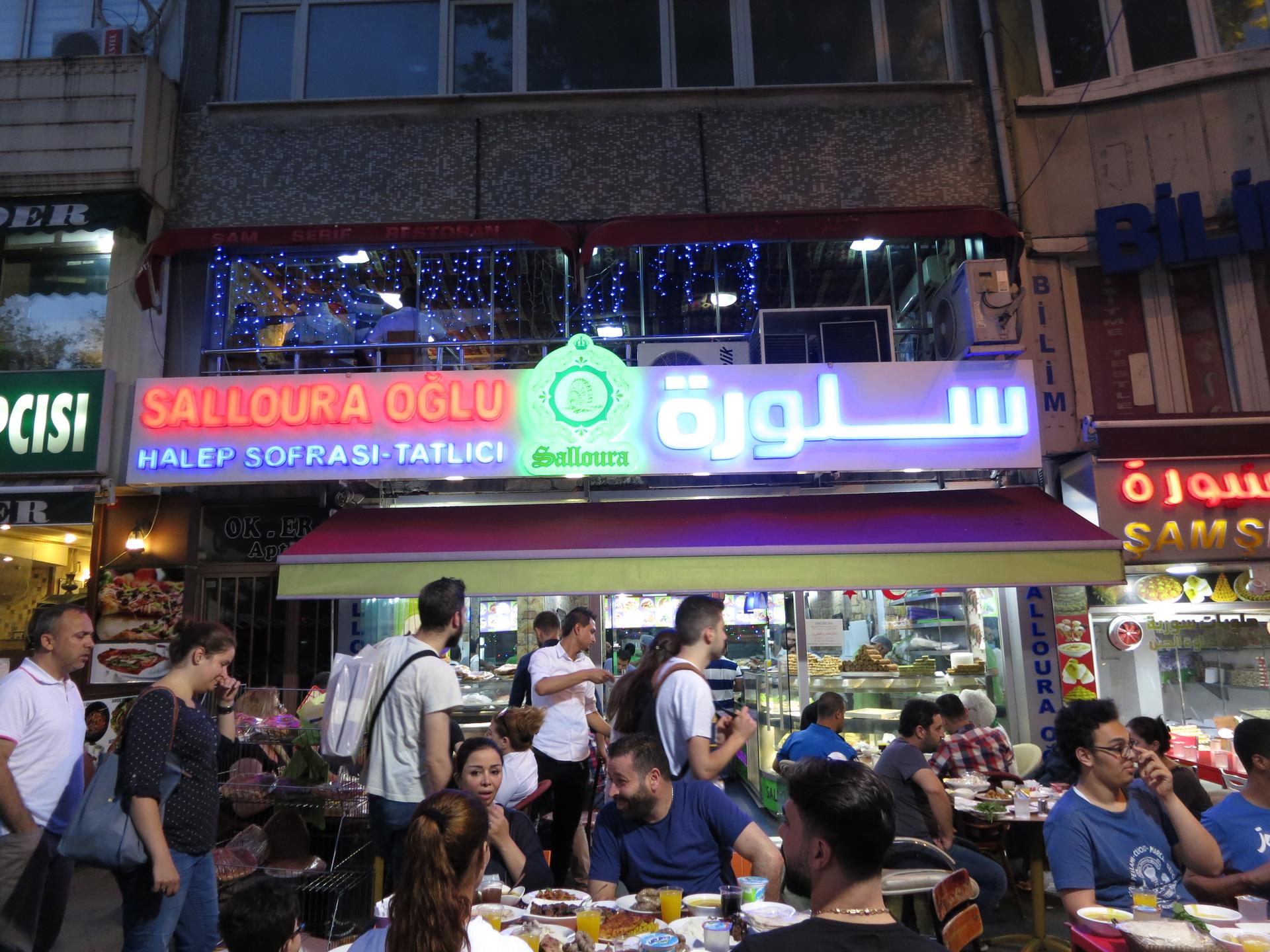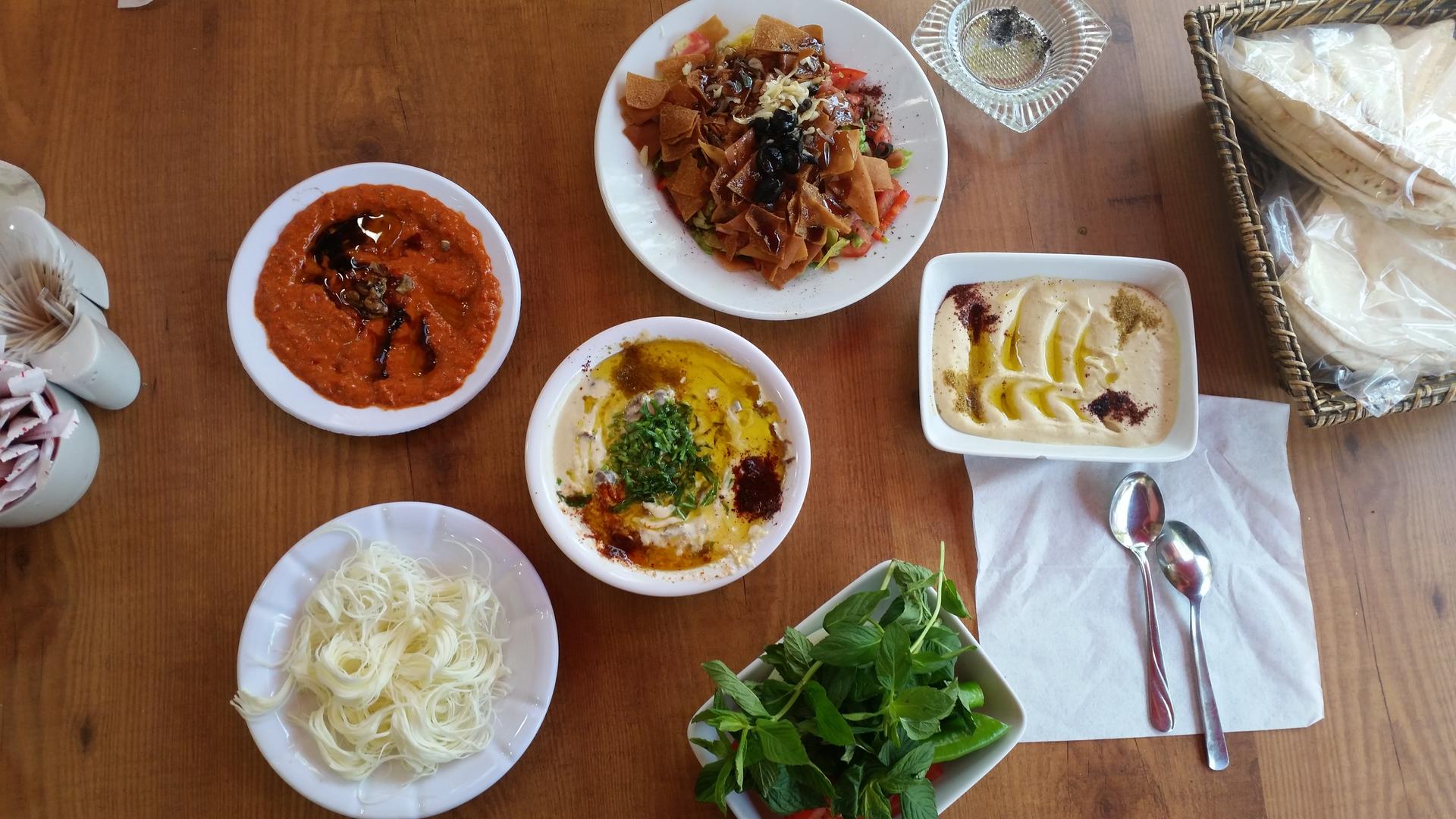Breakfast at Salloura in Istanbul: beans lathered in garlic yogurt and doused in olive oil, surrounded by plates of hummus, muhammara (a red pepper spread sweetened with pomegranate syrup), cheese and fattoush salad.
For most of my life, whenever anyone asked where I was from, I’d say, “Syria.”
My parents are from Syria. My grandparents are from Syria. My Syrian heritage stretches back centuries. But I never lived there.
I was born and raised in the US and Spain, speaking English and Spanish at school and with my friends. But home was strictly Syrian: We spoke Arabic, embodied Syrian customs and, most importantly, we ate Syrian food.
For lunch, my grandma would prepare feasts of stuffed zucchini simmered in a tomato based sauce with cracked mint (kusa mihshi), poached chicken stewed with deep green jute leaves flavored with sauteed cilantro and garlic (molokhiyya) and — a childhood favorite — balls of golden flaky puff pastry stuffed with rice, green peas and spiced ground beef and pine nuts (oozie).
Homemade hummus was always in our fridge. My grandma would even make her own baby pita pockets.
Even after my mom and I left my grandparents’ home in Spain, when we moved to Virginia in the 1990s, our eating habits remained the same.
My grandmother would handwrite recipes and fax them to us. Long glossy sheets filled with the sinuous letters of Arabic would slowly creep out of the machine. Her instructions would say things like, “Use a finger-length of butter,” and my mom would call her to ask, “Whose finger-length? Mine or yours? Which finger? The pinky?”
I finally went to Syria in 2010, when I was 22. The last time I visited, I was a toddler; my only memory was the smell of the jasmine trees in my great grandmother’s garden.
I realized quickly I wasn’t from Syria. My tongue tangled up easily at unfamiliar words — the Arabic I spoke was relegated to the home, and there were so many things I just didn’t know how to say. The rules of the road, or the fact that there were none, shocked me.
The boldness and intimacy with which strangers greeted me made me think I was the butt of some joke. I wasn’t. Ask anyone who has spent time with Syrians: They are endless wells of hospitality and generosity.
Despite all I didn’t know, I was fluent in the language of food. “You may not be from Syria, darling, but you are of it,” my great aunt told me after our first lunch together.
The following year marked the so-called “Arab Spring” and one by one, long-standing dictatorships in the Middle East and North Africa were toppled by popular revolts. When Syrians took to the streets in March 2011, they demanded reform. The government responded with bullets. Most of my family has since left Syria, taking their recipes with them. Few have stayed behind.
In the five years that have followed, news from Syria can be boiled down to montages of people angry, bloodied and afraid; young men with beards in military fatigues dodging behind crumbled buildings; the black foreboding flags of the so-called Islamic State; children pulled from the rubble of bombed out buildings; masses of people crossing borders into neighboring countries or being saved from the sea.
More from Dalia: The making of a Syrian refugee celebrity chef — in Gaza
That’s all the world knows about Syria; and while those images are real life for many Syrians, it doesn’t define them. I want to show the Syria behind the headlines — the one I saw in 2010, and that’s still so engrained in Syria’s people.
That’s why, over the coming months, I’ll be reporting stories of Syrians from one of the most intimate places — the kitchen. Here's my first.
The story of Salloura follows the journey of a Syrian pastry shop from the city of Aleppo to Turkey’s largest city, Istanbul, and the workers who carry the craft with hopes of starting fresh in Germany.
Listen to the full podcast here, or subscribe on iTunes:
Like As’ad, Ahmed and Rashed — the three main characters in my story — as Syrians move further from home in search of a new life, they carry with them the culture that does define them, the recipes that taste like home.

This is the first tale in a series that will bring Syrians closer to the world. Because at the end of the day, what's more understandable than sitting down around the table and eating food you love, with people you care about?
Dalia and Lauren were on Facebook, answering questions about their story, the food and its connection to Syrian culture.

Dalia Mortada is the Middle East Reporting Fellow for The GroundTruth Project. She was awarded the fellowship in spring 2015 to report on the region, beyond conflict. This story is part of an ongoing series that explores the Syrian diaspora through stories of food. The story of Salloura is also co-written with GroundTruth’s Middle East Correspondent Lauren Bohn, and can be found at thegroundtruthproject.org or anywhere you find your podcasts.
We want to hear your feedback so we can keep improving our website, theworld.org. Please fill out this quick survey and let us know your thoughts (your answers will be anonymous). Thanks for your time!
